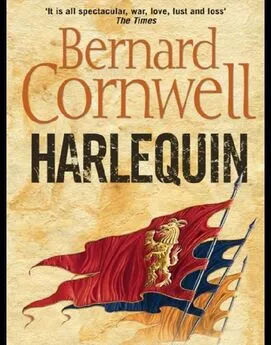Bernard Cornwell - The Grail Quest 2 - Vagabond
- Название:The Grail Quest 2 - Vagabond
- Автор:
- Жанр:
- Издательство:неизвестно
- Год:неизвестен
- ISBN:нет данных
- Рейтинг:
- Избранное:Добавить в избранное
-
Отзывы:
-
Ваша оценка:
Bernard Cornwell - The Grail Quest 2 - Vagabond краткое содержание
In Harlequin, Thomas of Hookton travelled to France as an archer and there discovered a shadowy destiny, which linked him to a family of heretical French lords who sought Christendom′s greatest relic.
Having survived the battle of Crécy, Thomas is sent back to England, charged with finding the Holy Grail. But Thomas is an archer and when a chance comes to fight against an army invading northern England he jumps at it. Plunged into the carnage of Neville′s Cross, he is oblivious to other enemies who want to destroy him. He discovers too late that he is not the only person pursuing the grail, and that his rivals will do anything to thwart him.
After hunting and wounding him, Thomas′s enemies turn him into a fugitive. Fleeing England, he travels to Normandy, determined to rescue Will Skeat, his old commander from Harlequin. Finally Thomas leads his enemies back to Brittany, where he goes to discover an old love and where his pursuers at last trap their reluctant pilgrim.
Vagabond is a vivid and realistic portrait of England at a time when the archer was king of Europe′s battlefields.
The Grail Quest 2 - Vagabond - читать онлайн бесплатно ознакомительный отрывок
Интервал:
Закладка:
'I am merely a Jew,' Mordecai said blandly, 'so what can I know of the saviour of mankind? And there are those who say_ I should not even speak of such things, but so far as I understand Jesus was not rich. Am I right?'
'He was poor,' Thomas said.
'So I am right, he was not a rich man, and at the end of his life he attends a seder.'
'A seder?'
'The Passover feast. Thomas. And at the seder he eats bread and drinks wine, and the Grail, tell me if I am wrong, was either the bread dish or the wine goblet, yes?'
'Yes.'
'Yes,' Mordecai echoed and glanced off to his left where a small fishing boat rode the broken swell. There had been no sign of the Saint-Esprit all morning, and none of the smaller boats they passed showed any interest in the Pentecesr. 'Yet if Jesus was poor,'
Mordecai said, 'what kind of seder dish would he use? One made of gold? One ringed with jewels? Or a piece of common pottery?'
'Whatever he used,' Thomas said, 'God could transform.'
'Ah yes, of course, I was forgetting,' Mordecai said. He sounded disappointed, but then he smiled and gave Thomas the book. 'When we reach wherever we are going,' he said, 'I can write down translations of the Hebrew for you and I hope it helps.'
'Thomas!' Sir Guillaume bellowed from the stern. We need fresh arms to bail water!'
The caulking had not been finished and the Pentecost was taking water at an alarming rate and so Thomas vent down into the bilge and handed up the pails to Robbie who jettisoned the water over the side. Sir Guillaume had been pressing Villerov to go north and east again in an attempt to run past Caen and make Dunkirk, but Villerov was unhappy with his small sail and even more unhappy with the leaking hull. 'I have to put in somewhere soon,' he growled, 'and you have to buy me a sail.'
They dared not call into Normandy. It was well known throughout the province that Sir Guillaume had been declared a traitor and if the Pentecost was searched – and it was probable on this smuggling coast that she would be – then Sir Guillaume would be discovered. That left Brittany and Sir Guillaume was eager to make Saint-Malo or SaintBrieuc, but Thomas protested from the bilge that he and Will Skeat would be considered enemies by the Breton authorities who, in those towns, held allegiance to Duke Charles who was struggling against the English-backed rebels who reckoned Duke Jean was Brittany's true ruler. 'So where would you go?' Sir Guillaume demanded. 'England?'
'We'll never make England,' Villerov_ said unhappily, looking at his sail.
'The islands?' Thomas suggested, thinking of Guernsey or Jersey.
'The islands!' Sir Guillaume liked that idea.
This time it was Villerov who objected. 'Can't do it,' he said bluntly and explained that the Pentecost was a Guernsey boat and he had been one of the men who helped capture her. 'I take her into the isles,' he said, 'and they'll take her back and me with her.'
'For God's sake!' Sir Guillaume snarled. 'Then where do we go?'
'Can you make Treguier?' Will Skeat asked and everyone was so astonished he had spoken that for a few heartbeats no one responded.
'Treguier?' Villeroy asked after a while, then nodded. 'Like as not.' he said.
'Why Treguier?' Sir Guillaume demanded.
'It was in English hands last I heard,' Skeat said. 'Still is.' Villerov put in.
'And we've got friends there,' Skeat went on.
And enemies, Thomas thought. Treguier was not just the closest Breton port in English hands, but also the harbour closest to La Roche-Derrien where Sir Geoffrey Carr, the Scarecrow, had gone. And Thomas had told Brother Germain that he was headed for the same small town, and that would surely mean de Taillebourg would hear of it and follow. And perhaps Jeanette was there too, and suddenly, though Thomas had been saying for weeks that he would not go back, he desperately wanted to reach La Roche-Derrien.
For it was there in Brittany, he possessed friends, old lovers and enemies he wanted to kill.
Part Three
Brittany, spring 1347
The King's Cupbearer
Jeanette Chenier, Comtesse d'Armorique, had lost her husband, her parents, her fortune, her house, her son and her royal lover, and all before she was twenty years old. Her husband had been lost to an English arrow and had died in agony, weeping like a child.
Her parents had died of the bloody flux and their bedclothes had been burned before they were buried near the altar of St Renan's church. They had left Jeanette, their only remaining child, a small fortune in gold, a wine-shipping business and the great merchant's house on the river in La Roche-Derrien. Jeanette had spent much of the fortune on equipping ships and men to fight the hated English who had killed her husband, but the English won and thus the fortune vanished. Jeanette had begged help from Charles of Blois, Duke of Brittany and her dead husband's kinsman, and that was how she had lost her son. The three-year-old Charles, named for the duke, had been snatched from her. She was called a whore because she was a mer-chant's daughter and thus unworthy to be an aristocrat and Charles of Blois, to show Jeanette how much he despised her, had raped her. Her son, now the Count of Armorica, was being raised by one of Charles of Blois's loyal supporters to ensure that the boy's extensive lands stayed sworn to the house of Blois. So Jeanette, who had lost her fortune in the attempt to make Duke Charles the undisputed ruler of Brittany, learned a new hatred and found a new lover, Thomas of Hookton. She fled north with him to the English army in Normandy and there she had caught the eye of Edward of Woodstock, Prince of Wales, and so Jeanette had abandoned Thomas. But then, fearing that the English would be crushed by the French in Picardy and that the victorious French would punish her for her choice of lover, she had fled again. She had been wrong about the battle, the English had won, but she could not go hack. Kings, and the sons of Kings, did not reward fickleness and so Jeanette Chenier, dowager Countess of Armorica, had gone back to La Roche-Derrien to find she had lost her house.
When she had left La Roche-Derrien she had been deeply in debt and Monsieur Belas, a lawyer, had taken the house to pay those debts. Jeanette, on her return, possessed money enough to pay all she owed, for the Prince of Wales had been generous with jewels, but Belas would not move from the house. The law was on his side. Some of the English who occupied La Roche-Derrien showed sympathy for Jeanette, but they did not interfere with the decision of the court and it would not have mattered overmuch if they had, for everyone knew the English could not stay in the small town for long. Duke Charles was gathering a new army in Rennes and La Roche-Derrien was the most iso-lated and remote of all the English strongholds in Brittany, and when Duke Charles snapped up the town he would reward Monsieur Belas, his agent, and scorn Jeanette Chenier whom he called a whore because she was not nobly born. So Jeanette, unable to claim back her house, found another, much smaller, close to La Roche-Derrien's southern gate and she confessed her sins to the priest at St Renan's church, who said she had been wicked beyond man's measure and perhaps beyond God's measure as well; the priest promised her absolution if she would sin with him and he hoisted up his robes and reached for her, then cried aloud as Jeanette kicked him. She continued to take mass at St Renan's, for it was her childhood church and her parents were buried beneath the painting of Christ emerging from the tomb with a golden light about His head, and the priest dared not refuse her the sacrament and dared not meet her eyes.
Jeanette had lost her servants when she fled north with Thomas, but she hired a fourteen-year-old girl to be her kitchen maid and the girl's idiot brother to draw water and collect firewood. The Prince's jewels, Jeanette reckoned, would last her a year and something would turn up by then. She was young, she was truly beautiful, she was filled with anger, her child was still a hostage and she was inspired by hatred. Some in the town feared she was mad because she was much thinner than when she had left La Roche-Derrien, but her hair was still raven-black, her skin as smooth as the rare silk that only the wealthiest could afford and her eyes were big and bright. Men came and begged her favours, but were told they could not speak to her again unless they brought her the shrivelled heart of Belas the lawyer and the shrivelled prick of Charles of Blois. 'Bring them both to me in reliquaries,' she told them, 'but bring me my son alive.' Her anger repelled men and some of them spread the tale that she was moon-touched, perhaps a witch. The priest of St Renan's confided to the other clergy in the town that Jeanette had tried to tempt him and he spoke darkly of bringing in the Inquisition, but the English would not permit it for the King of England refused to let the torturers of God work their dark arts in his possessions. 'There's enough grumbling,' Dick Totesham, commander of the English garrison in La Roche-Derrien said, 'without bringing in damned friars to stir up trouble.'
Totesham and his garrison knew that Charles of Blois was raising an army that would attack La Roche-Derrien before marching on to besiege the other English strong-holds in Brittany, and so they worked hard to make the town's walls higher and to build new ramparts outside the old. Local farm labourers were whipped to the work. They were forced to push barrowloads of clay and rock, they drove timbers into the soil to make palisades and they dug ditches. They hated the English for forcing them to work without pay, but the English did not care for they had to defend themselves and Totesham pleaded with Westminster to send him more men and on the feast of St Felix, in the middle of January, a troop of Welsh archers landed at Treguier, which was the small harbour an hour and a half's walk upriver from La Roche-Derrien, but the garrison's only other reinforcements were a few knights and men-at-arms who were down on their luck and came to the small town in hope of plunder and prisoners. Some of those knights came from as far away as Flanders, lured by false rumours of the riches to be had in Brittany, and another six menat-arms arrived from northern Eng-land, led by a malevolent, raw-faced man who carried a whip and a heavy load of grudges, and they were La Roche-Derrien's last reinforcements before the Pentecost came to the river. La Roche-Derrien's garrison was small, but Duke Charles's army was large and grew even larger. Spies in English pay told of Genoese crossbowmen arriving at Rennes in companies a hundred strong, and of men-at-arms riding from France to swear fealty to Charles of Blois. His army swelled and the King of England, apparently careless of his garrisons in Brittany, sent them no help. Which meant that La Roche-Derrien, smallest of all the English fortress towns in Brittany and the one closest to the enemy, was doomed. Thomas felt strangely unsettled as the Pentecost slipped between the low rocky outcrops that marked the mouth of the River Jaudv. Was it a failure, he wondered, to be coming back to this small town? Or had God sent him because it was here that the enemies of the Grail would be seeking him? That was how Thomas thought of the mysterious de Taillebourg and his servant. Or perhaps, he told himself, he was merely nervous of seeing Jeanette again. Their history was too tangled, there was too much hate mixed with the love, yet he did want to see her and he was worried she would not want to see him. He tried and failed to conjure a picture of her face as the incoming tide carried the Pentecost into the river's mouth, where guillemots spread their ragged black wings to dry above rocks fretted with white foam. A seal raised its glistening head, stared indignantly at Thomas and then went back to the depths. The river-banks came closer, bringing the smell of land. There were boulders and pale grass and small wind-bent trees, while in the shallows there were sinuous fish traps made from woven willow stakes. A small girl, scarce more than six years old, used a stone to knock limpets from the rocks. 'It's a poor supper, that,' Will Skeat remarked.
Читать дальшеИнтервал:
Закладка:





![Робин Хобб - Странствия Шута [Fool’s Quest]](/books/1086209/robin-hobb-stranstviya-shuta-fool-s-quest.webp)

